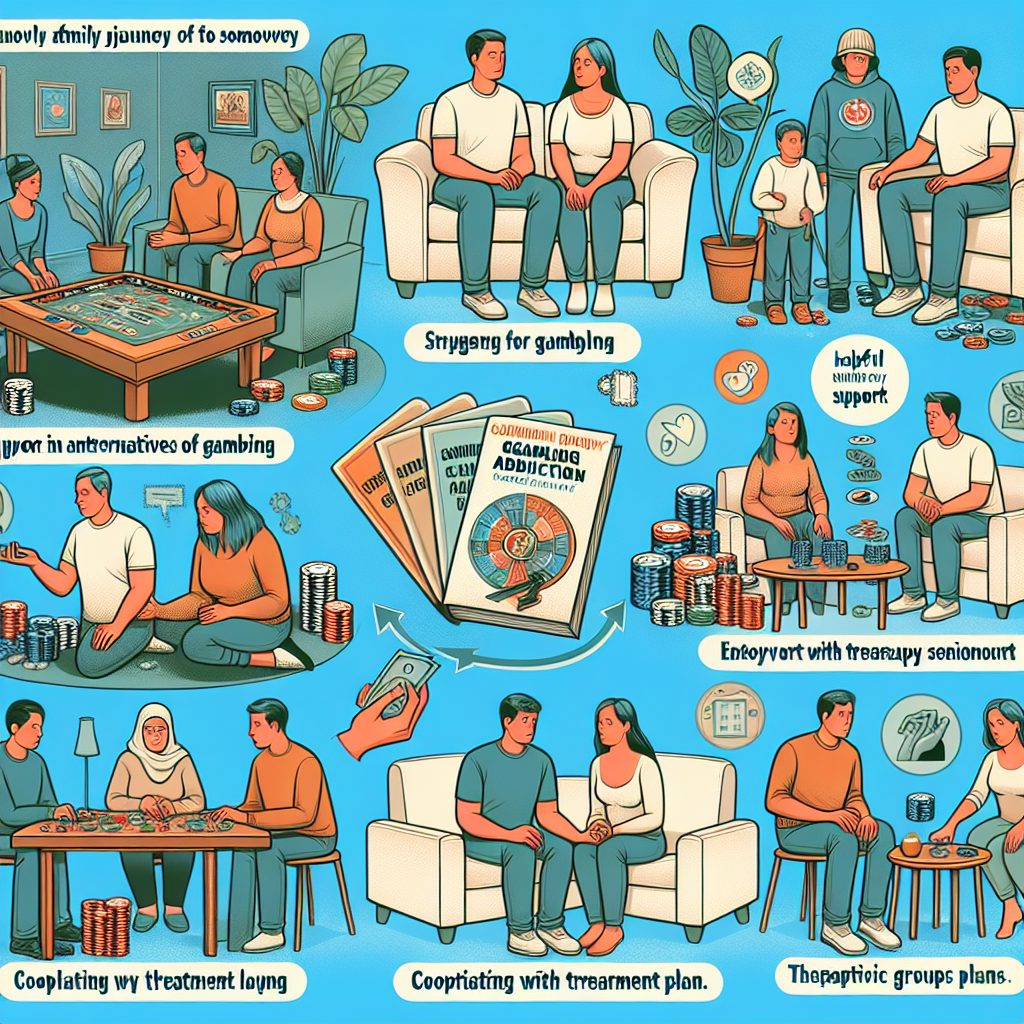-
Table of Contents

“Together We Heal: Family Support for Gambling Addiction Recovery”
Introduction
Family members play a crucial role in supporting a loved one through gambling addiction recovery. Their involvement can significantly impact the success of the recovery process. By providing emotional support, setting healthy boundaries, and encouraging professional treatment, family members can help create a stable and nurturing environment conducive to recovery. Additionally, educating themselves about the nature of gambling addiction and participating in support groups can equip them with the tools needed to effectively assist their loved one. Through understanding, patience, and active involvement, family members can be instrumental in helping someone overcome gambling addiction and rebuild their life.
Effective Communication Strategies For Supporting A Family Member’s Gambling Addiction Recovery
Supporting a family member through gambling addiction recovery can be a challenging yet profoundly rewarding journey. Effective communication is a cornerstone of this support, fostering an environment of trust, understanding, and encouragement. By employing thoughtful communication strategies, family members can significantly contribute to their loved one’s path to recovery.
First and foremost, it is essential to approach conversations with empathy and without judgment. Gambling addiction often carries a heavy stigma, and individuals struggling with it may already feel a deep sense of shame and guilt. By expressing genuine concern and compassion, family members can create a safe space where their loved one feels understood and accepted. Phrases like “I am here for you” and “I want to understand what you’re going through” can open the door to honest dialogue.
Active listening is another critical component of effective communication. This means giving full attention to the person speaking, acknowledging their feelings, and refraining from interrupting or offering unsolicited advice. Reflective listening, where you paraphrase what the other person has said to ensure understanding, can also be beneficial. For instance, saying “It sounds like you’re feeling overwhelmed by the urge to gamble” can validate their experience and show that you are truly engaged in the conversation.
Setting boundaries is equally important in supporting a family member’s recovery. While it is natural to want to help, it is crucial to avoid enabling behaviors that may inadvertently support the addiction. Clear, consistent boundaries help both parties understand what is acceptable and what is not. For example, agreeing not to lend money or cover debts can prevent further financial harm and encourage the individual to take responsibility for their actions.
Encouraging professional help is another vital step. While family support is invaluable, gambling addiction often requires specialized treatment from therapists, counselors, or support groups. Gently suggesting resources and offering to assist in finding professional help can make a significant difference. Statements like “I believe talking to a professional could really help you” or “Let’s look for a support group together” can show your commitment to their recovery without being overbearing.
Moreover, maintaining open lines of communication about progress and setbacks is crucial. Recovery is rarely a linear process, and there will be ups and downs along the way. Celebrating small victories and providing reassurance during difficult times can help sustain motivation. Phrases such as “I’m proud of the progress you’re making” or “It’s okay to have setbacks; what’s important is that you’re trying” can offer much-needed encouragement.
Additionally, educating oneself about gambling addiction can enhance communication and support efforts. Understanding the nature of the addiction, its triggers, and its impact can provide valuable insights and foster more meaningful conversations. Sharing this knowledge with the affected family member can also help them feel less isolated and more understood.
Finally, taking care of oneself is essential for sustaining the ability to support a loved one effectively. Supporting someone through addiction recovery can be emotionally taxing, and it is important to seek support for oneself, whether through friends, support groups, or professional counseling. By maintaining one’s well-being, family members can remain strong and resilient, providing the steady support their loved one needs.
In conclusion, effective communication strategies are vital in supporting a family member’s gambling addiction recovery. By approaching conversations with empathy, practicing active listening, setting boundaries, encouraging professional help, maintaining open communication, educating oneself, and taking care of personal well-being, family members can create a supportive environment that fosters recovery and hope. Through these efforts, they can help their loved one navigate the challenging path to a healthier, addiction-free life.
Creating A Supportive Home Environment For Gambling Addiction Recovery
Creating a supportive home environment for gambling addiction recovery is crucial for the well-being and long-term success of the individual struggling with this issue. Family members play a pivotal role in this process, and their involvement can make a significant difference. Understanding the complexities of gambling addiction and adopting a compassionate, proactive approach can foster a nurturing atmosphere conducive to recovery.
First and foremost, it is essential for family members to educate themselves about gambling addiction. This knowledge can help them comprehend the psychological and emotional challenges their loved one faces. By understanding that gambling addiction is a mental health disorder, family members can approach the situation with empathy rather than judgment. This shift in perspective can create a more supportive and less confrontational environment, which is vital for recovery.
Communication is another cornerstone of a supportive home environment. Open, honest, and non-judgmental conversations can help build trust and encourage the individual to share their struggles and progress. It is important to listen actively and validate their feelings, showing that you are there to support them unconditionally. This can help reduce feelings of isolation and shame, which are often associated with addiction.
Setting clear boundaries is also crucial. While it is important to be supportive, enabling behaviors can be detrimental to recovery. Family members should avoid providing financial assistance that could be used for gambling and instead encourage their loved one to seek professional help. This might include therapy, support groups, or rehabilitation programs. By setting these boundaries, family members can help the individual take responsibility for their actions and work towards sustainable recovery.
Creating a structured and stable home environment can further aid in the recovery process. Establishing routines and encouraging healthy habits, such as regular exercise, balanced nutrition, and sufficient sleep, can help the individual regain a sense of normalcy and control. Engaging in family activities that do not involve gambling can also provide positive distractions and strengthen familial bonds.
Moreover, it is important to celebrate small victories and progress. Recovery is a long and often challenging journey, and acknowledging even the smallest achievements can boost morale and motivation. Positive reinforcement can help the individual feel valued and supported, reinforcing their commitment to recovery.
Family members should also take care of their own well-being. Supporting a loved one through addiction recovery can be emotionally taxing, and it is important to seek support for oneself as well. This might include joining support groups for families of individuals with gambling addiction, seeking therapy, or simply taking time for self-care. By maintaining their own mental and emotional health, family members can be more effective in providing support.
Lastly, patience and perseverance are key. Recovery from gambling addiction is not a linear process, and setbacks are common. It is important to remain patient and continue offering support, even during difficult times. Encouraging a mindset of resilience and hope can help the individual stay committed to their recovery journey.
In conclusion, creating a supportive home environment for gambling addiction recovery involves a combination of education, communication, boundary-setting, structure, positive reinforcement, self-care, and patience. By adopting these strategies, family members can play a crucial role in helping their loved one overcome gambling addiction and build a healthier, more fulfilling life.
Q&A
1. **Question:** What is one way family members can support a loved one in gambling addiction recovery?
**Answer:** Family members can support a loved one in gambling addiction recovery by encouraging them to seek professional help, such as therapy or support groups like Gamblers Anonymous.
2. **Question:** How can family members help create a supportive environment for someone recovering from gambling addiction?
**Answer:** Family members can help create a supportive environment by setting clear boundaries, avoiding enabling behaviors, and providing emotional support and understanding throughout the recovery process.
Conclusion
Family members can support gambling addiction recovery by providing emotional support, encouraging professional treatment, setting boundaries, monitoring financial activities, and participating in therapy or support groups. They should educate themselves about the addiction, avoid enabling behaviors, and maintain open, non-judgmental communication to foster a supportive environment conducive to recovery.



